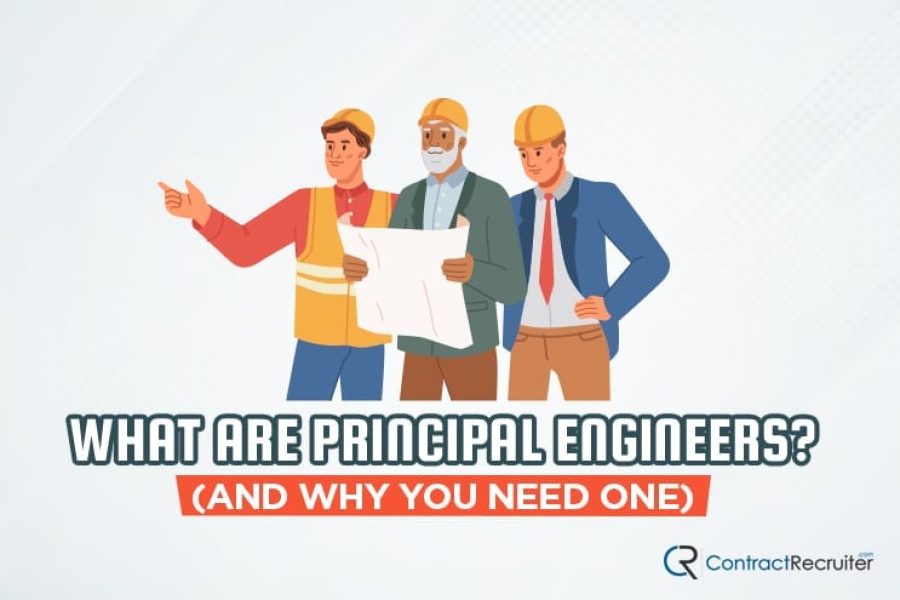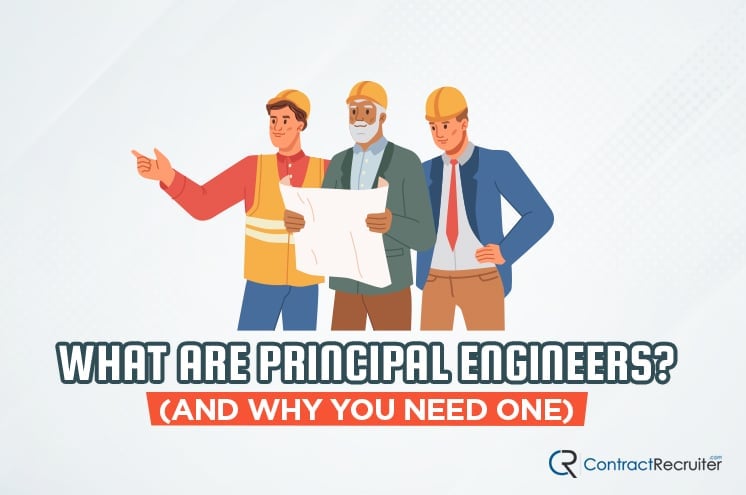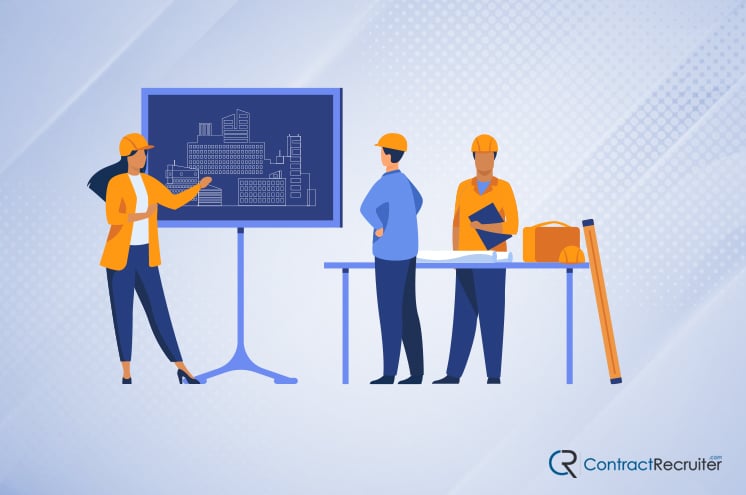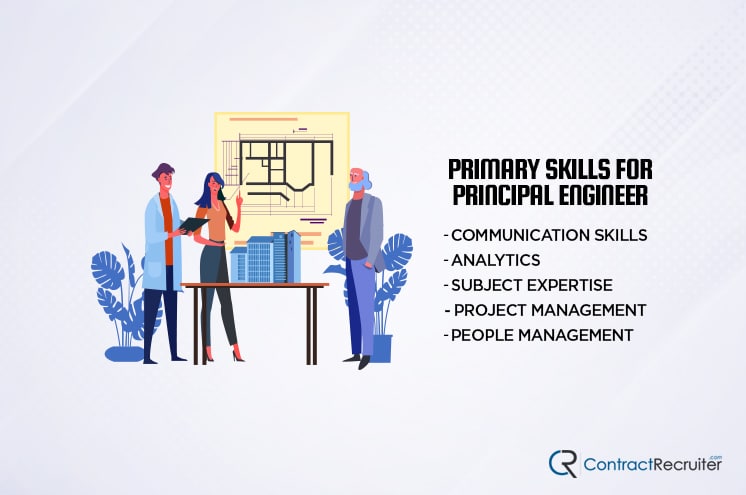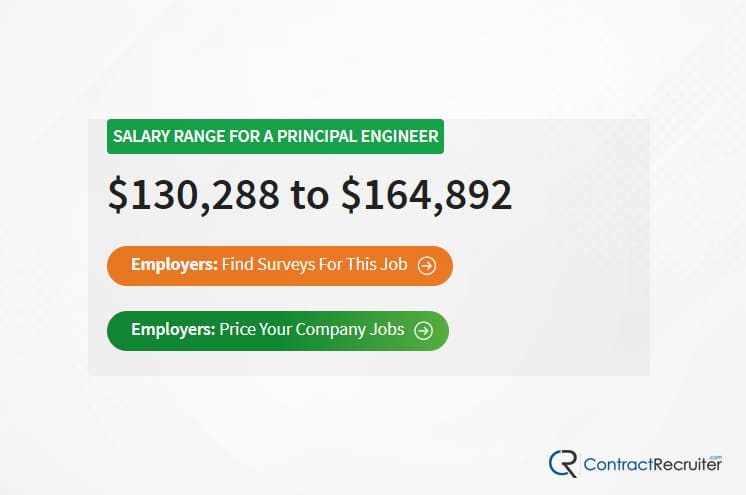According to Manpower Group’s Talent Shortage Survey, engineers are one of the top ten careers facing talent shortages. For example, there are seventeen job openings for every electrical engineering candidate looking for a job.
Engineering is a broad industry that can be broken down into many more specific fields, such as mechanical, electrical, civil, chemical, nuclear, and aerospace. Finding the right candidate in the appropriate field can be challenging, but you must compete with other organizations to attract top talent.
Within each field of engineering, there is a hierarchy of positions based on the responsibilities, skills, and experience of people in this profession. One of the highest-level positions in engineering is that of a principal engineer.
What exactly is a principal engineer, and why do you need one? Let’s take a look at everything you need to know.
What Is a Principal Engineer?
Highly experienced engineers overseeing the entirety of various projects are known as principal engineers. These individuals have quite a bit of experience in their field and are ready to take on a leadership role for other team members.
There are many duties that principal engineers are typically responsible for, including:
- Creating and implementing goals through the use of strategic planning
- Overseeing and managing every phase of projects
- Acting as an expert in their particular field of engineering and helping team members with less experience during every stage of a project
- Hiring team members, training new hires, delegating tasks, and overall acting as a team supervisor
- Meeting with stakeholders to develop a timeline, negotiate prices, and discuss budgets
Engineers almost always specialize in one area of the industry, which means that there are principal engineers in every field of engineering. Depending on your organization’s project, you might need a chemical engineer, a civil engineer, an electrical engineer, a mechanical engineer, or one of the many other types of engineers to fill this high-level position.
What Qualifications Does a Person Need to Be a Principal Engineer?
Considering that principal engineers oversee entire projects and act as leaders to their team, it makes sense that you don’t see many recent grads filling these roles. Let’s look at the education requirements for principal engineers and the skills necessary for an individual to succeed in the role.
Education
For someone to be qualified as a principal engineer, they will need a bachelor’s degree in their specific engineering field. Depending on the undergraduate program an engineer attended, they may have received hands-on experience, or their learning might have been primarily classroom based.
In some instances, a principal engineer will also have a Master’s degree in addition to a bachelor’s degree.
A principal engineer will also be a registered professional engineer (PE) by earning state licensure.
While a bachelor’s degree is standard for principal engineers, many more years of experience must be gained before an individual is qualified to perform this role. It’s common for these engineers to have more than a decade of experience in their engineering field.
Skills
There are several skills that a principal engineer must have to be successful in the role.
Some primary skills you’ll want to look for when hiring a principal engineer are:
- Communication skills: Principal engineers must be highly skilled in verbal and written communication. Every day, they talk to team members and clients. For projects to go smoothly, principal engineers must be able to clearly and concisely communicate their ideas and thoughts, and any tasks they’re delegating.
- Analytics: Principal engineers are constantly working to improve the systems used to achieve goals and solve problems that pop up. To look at a technical situation and find the most appropriate solution, a principal engineer must be analytical.
- Subject expertise: It should be no surprise that a principal engineer should be a legitimate expert in their engineering field. After all, they oversee a project’s entirety, including research, development, and design. Anytime anyone has a question about the project, the principal engineer is the person to ask.
- Project management: There are always a lot of balls in the air when overseeing an entire project, so a principal engineer must be able to juggle all the moving parts at play. For example, they’ll need to stay on top of whether their team is staying under budget, reaching goals, and meeting deadlines.
- People management: Being a principal engineer also requires that a candidate has the people skills to manage a team. They will need to be able to give guidance, answer questions, delegate work, and work to set and achieve team goals.
Principal engineers are truly experts in their field and have developed a well-rounded skill set thanks to their years of experience. While technical skills are essential, a principal engineer won’t be able to fulfill the entirety of their duties without a wide variety of soft skills.
If you hire a principal engineer that doesn’t communicate well with others, for example, it could seriously impact the efficiency and productivity of the entire team. If the people working under your engineer don’t feel comfortable asking questions to the principal engineer, you’ll find that the whole project suffers.
Finding the right engineer for your organization can be difficult, particularly because of a talent shortage in the industry. While engineers are the people that help to improve the quality of life and transform society through the implementation of ideas into reality, there aren’t enough people entering the field to satisfy the heavy demand.
According to the Bureau of Labor Statistics, the U.S. will need about one million more STEM professionals than it is projected to produce by 2025. This can be particularly challenging when you’re looking to hire high-level engineers that have been in the industry for some time, as you’ll find that you’re competing with other top-tier companies for their talent.
What’s the Difference Between a Principal Engineer and a Senior Engineer?
Principal and senior engineers are both roles requiring an engineer to have many years of experience and extensive knowledge in their field. However, while they are both high-level engineering positions, these titles aren’t synonymous.
In general, principal engineers are higher on the hierarchy than senior engineers. Even though they both have plenty of experience and are roles at the top of the field, principal engineers act as leaders in their field and tend to take on more complex and advanced projects.
In general, the hierarchy of engineers goes, from lowest to highest, as follows:
- Staff engineer
- Senior Staff engineer
- Principal engineer
- Distinguished engineer
Staff engineers are one level above senior engineers. They possess core leadership skills, including critical thinking and communication skills, in addition to well-honed technical skills. A senior staff engineer is the next step up the hierarchy but is still below principal engineers.
A distinguished engineer is a position only given to individuals who have achieved outstanding technical achievement. This position is typically held at large organizations; not all companies will have a distinguished engineer. In this role, engineers can strengthen the company by building out their own areas of expertise.
If your organization is large, there might be a hierarchy among the principal engineers working for the company. From lowest to highest, the hierarchy typically goes like this:
- Principal engineer
- Senior principal engineer
- Distinguished principal engineer
- Fellow
While senior engineers usually report to their department or division leaders, principal engineers often report their project details and findings directly to senior management.
When it comes to impact on the operation of a company, principal engineers have more influence than senior engineers. While senior engineers are highly-skilled and have many years of experience, principal engineers are the next tier of expertise and are often considered one of their industry’s thought leaders.
Sometimes, a company might require that any principal engineer they hire has spent several years working as a senior engineer.
Why You Need a Principal Engineer
When your organization is implementing a project (or many projects) that requires an engineer to oversee the process from start to finish, you’re looking for a principal engineer. These individuals have the technical skills necessary to manage every stage of the project and the essential soft skills for overseeing a team and interacting with clients.
Without a principal engineer keeping an eye on the big picture, your projects can run into many expensive problems. Not only will the process be less efficient because there isn’t someone highly qualified to keep a bird’s eye perspective on the project, but you will also be lacking the vital problem-solving skills that a principal engineer will bring to the table.
As you might imagine, finding the right person for the job when searching for a principal engineer is essential. However, there are several reasons why hiring an engineer might be more difficult than you would expect. The reality is that there are more job listings for engineers than people to fill them, so organizations need to offer compelling reasons why engineers should choose their company over the competition. Check out our recent post to learn more about recruiting engineers of all kinds.
What Is the Salary For a Principal Engineer?
According to the U.S. Bureau of Labor Statistics, the median salary for engineers annually was $91,010 in 2016. However, median salaries can vary greatly depending on the specific field of engineering. For example, petroleum engineering is reported to be one of the top-paying occupations in the industry, with workers receiving a median wage in 2020 of $137,330. According to the United States BLS, computer hardware engineering, aerospace, and nuclear engineers are also among the highest-paid engineering industries.
When you’re talking about principal engineer salaries, though, you’re discussing high-level employees in a specific engineering field. It’s therefore important to understand the typical salary for principal engineers, not just in engineering as a whole, but within the more precise industry and field.
Salary.com says the average salary for a principal engineer in the U.S. is $144,663, with a typical range of $130,288 to $164,892. Estimates for the average starting salary of principal engineers hover around $97,000.
However, the range of salaries can vary immensely depending on several factors, including:
- Education
- Additional skills
- Specific field
- Years of experience
- Certifications
- Location
According to results from a Zippia.com survey that involved nearly 7,000 resumes, the most popular locations for principal engineers to reside are San Jose, California, and Houston, Texas. Generally, you can expect a higher density of principal engineers in larger urban areas and on the east and west coast.
Principal engineers are also in the highest demand in locations like California, Boston, New York City, and Midwestern cities like Chicago.
Location is one factor that significantly impacts how much money a principal engineer earns. California has the highest salaries for these high-level engineers, followed by New Mexico, Massachusetts, Texas, and Nevada. In states like Montana, Missouri, and Nebraska, principal engineers tend to have salaries on the lower end of the spectrum.
Finding top engineering candidates is difficult, but it’s not impossible. Some useful avenues for recruiting the best of the best include engineering industry trade shows and on-campus recruiting events. While you likely won’t find your next principal engineer at an on-campus recruiting event, this is a great place to find new engineers as they begin their careers and work towards higher-level engineering positions over time.
Do you have any questions about hiring a principal engineer for your organization? Or, perhaps, did you have any questions about recruitment, in general? If so, please feel free to leave a comment down below, and we’ll be sure to get a conversation started about either of the topics! We’re always happy to assist in any way we can when it comes to all things related to recruitment and hiring.
Additionally, be sure to check out our blog for further information on all things related to recruiting and hiring for specific industries, and in general! We have a vast catalog of information for you to peruse, and if you have any questions we haven’t answered in this article specifically, we very well may have already answered it in one of our previous posts! If we’ve missed the topic you’d like to know more about, let us know! We’d love to make our catalog as comprehensive as possible!

